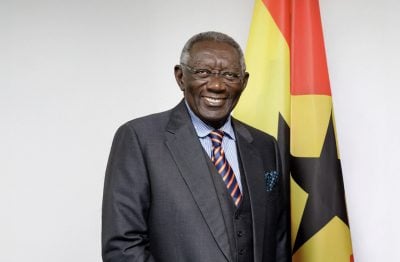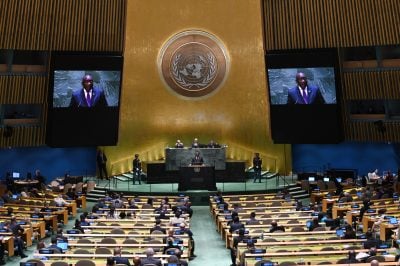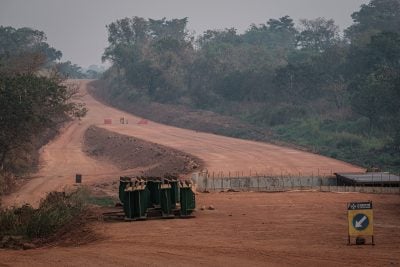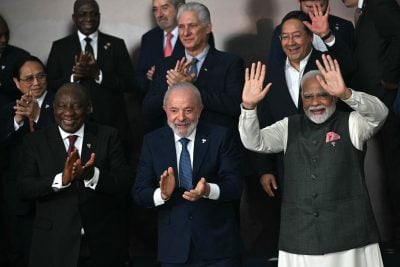Taiwan briefly imposed restrictions on the export of advanced semiconductor chips to South Africa this week, in an escalation of the ongoing diplomatic dispute between the two countries.
On Tuesday, Taiwan, one of the world’s largest manufacturers of the technology, announced that it would be imposing export controls on chips amid a diplomatic row over the status of Taipei’s de facto embassy in the country.
But by the end of the week, the Taiwanese government had backtracked on the export curbs – reportedly because of concerns that political intervention in semiconductor markets could undermine confidence in the giant Taiwan Semiconductor Manufacturing Company (TSMC).
Taiwan’s foreign ministry said that the restriction was suspended after South Africa agreed to talks on the status of its office. In 2023, shortly after hosting a BRICS summit, South Africa, a close ally of China, asked Taiwan to move its representatives outside of the capital, Pretoria, allegedly under pressure from Beijing. In February this year, the South African government set a March deadline for the move to be completed, although this was ignored.
China has pressured African allies to abolish diplomatic ties with Taiwan, which it sees as an illegal breakaway province.
Supply chain fears
While the u-turn was swift, the spat has raised fears that some South African industries reliant on chips could be exposed to future actions. South Africa’s foreign ministry complained that the measures sought to “disrupt the stability of the global supply chain of semiconductors”.
Chris Hattingh, executive director at the Centre for Risk Analysis in Johannesburg, tells African Business that “while the immediate impact of this to the South African tech sector would be minimal, there is a risk for the auto sector, given so many manufacturers in South Africa are reliant on those chip imports.”
More broadly, Hattingh is concerned that deteriorating relations between Pretoria and Taipei could impact the operations of the 450 factories he says are owned by Taiwanese entrepreneurs in South Africa, which employ around 40,000 people across the country.
While Taiwan has now dropped its restrictions on chip exports to South Africa, Menzi Ndhlovu, a senior political and economic analyst at the Signal Risk consultancy in Cape Town, says that “the message from Taiwan is that South Africa should remember that they have substantial leverage over semiconductors.”
“Although overall trade between South Africa and Taiwan is not particularly high – Taiwan ranks as South Africa’s 25th largest trading partner – what is traded is particularly important, and there are very few substitutes,” Ndhlovu adds.
South African businesses rue foreign policies
The row with Taiwan comes at a time when South Africa is also having to deal with diplomatic challenges on several fronts, with relations with the United States particularly poor under the presidency of Donald Trump since a chaotic Oval Office meeting with President Cyril Ramaphosa in May.
Ndhlovu suggests the business community is concerned about the impact the country’s foreign policy is increasingly having on the country’s economic standing.
“I’ve spoken to a number of stakeholders in South Africa’s commercial sector who do not necessarily have a political position, but they have taken issue with South Africa’s mismanagement of foreign policy and its inconsistency,” he tells African Business.
“Poor diplomatic messaging – particularly with the United States – has posed a significant economic threat to South Africa. Because of our failure to craft a sound foreign policy with the US or respond to the challenge the US has put forward, we risk losing out on AGOA (the African Growth and Opportunity Act), one of our most lucrative trade agreements,” Ndhlovu adds.
“There are concerns about how South Africa’s various foreign policy and political bungles might impact the country’s reputation in the eyes of foreign investors, particularly portfolio investors, as well as on financial markets.”
Want to continue reading? Subscribe today.
You've read all your free articles for this month! Subscribe now to enjoy full access to our content.
Digital Monthly
£8.00 / month
Receive full unlimited access to our articles, opinions, podcasts and more.
Digital Yearly
£70.00 / year
Our best value offer - save £26 and gain access to all of our digital content for an entire year!
 Sign in with Google
Sign in with Google 



